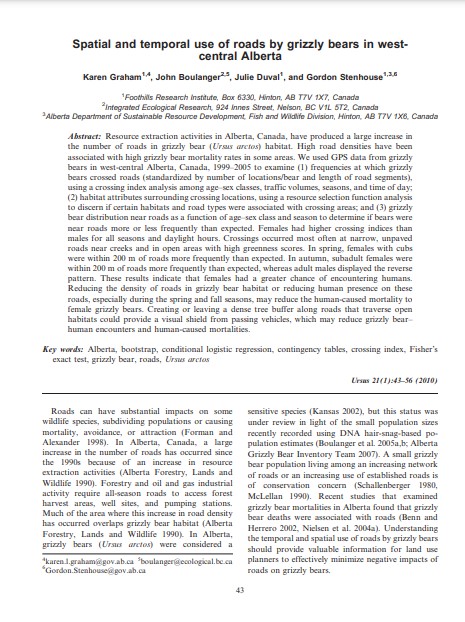Spatial and temporal use of roads by grizzly bears in west-central Alberta
Bosque Modelo:
Foothills
Temática:
Conservación
Tipo de documento:
Otros
Resumen
Resource extraction activities in Alberta, Canada, have produced a large increase in the number of roads in grizzly bear (Ursus arctos) habitat. High road densities have been associated with high grizzly bear mortality rates in some areas. We used GPS data from grizzly bears in west-central Alberta, Canada, 1999–2005 to examine (1) frequencies at which grizzly bears crossed roads (standardized by number of locations/bear and length of road segments), using a crossing index analysis among age–sex classes, traffic volumes, seasons, and time of day; (2) habitat attributes surrounding crossing locations, using a resource selection function analysis to discern if certain habitats and road types were associated with crossing areas; and (3) grizzly bear distribution near roads as a function of age–sex class and season to determine if bears were near roads more or less frequently than expected. Females had higher crossing indices than males for all seasons and daylight hours. Crossings occurred most often at narrow, unpaved roads near creeks and in open areas with high greenness scores. In spring, females with cubs were within 200 m of roads more frequently than expected. In autumn, subadult females were within 200 m of roads more frequently than expected, whereas adult males displayed the reverse pattern. These results indicate that females had a greater chance of encountering humans. Reducing the density of roads in grizzly bear habitat or reducing human presence on these roads, especially during the spring and fall seasons, may reduce the human-caused mortality to female grizzly bears. Creating or leaving a dense tree buffer along roads that traverse open habitats could provide a visual shield from passing vehicles, which may reduce grizzly bear–human encounters and human-caused mortalities.
Información Bibliográfica
Autor:
Graham, K., Boulanger, J., Duval, J., & Stenhouse, G.
Año:
2010
N°:
1
País :
Canadá
Páginas:
43 - 56
Edición:
-
Volumen:
21
Idioma:
Ingles
Palabras claves
Alberta, bootstrap, conditional logistic regression, contingency tables, crossing index, Fisher’s exact test, grizzly bear, roads, Ursus arctos





